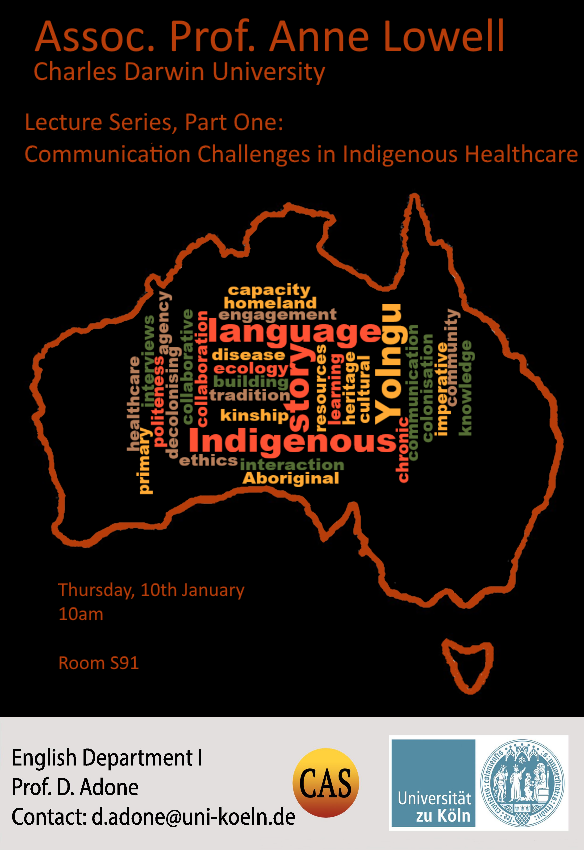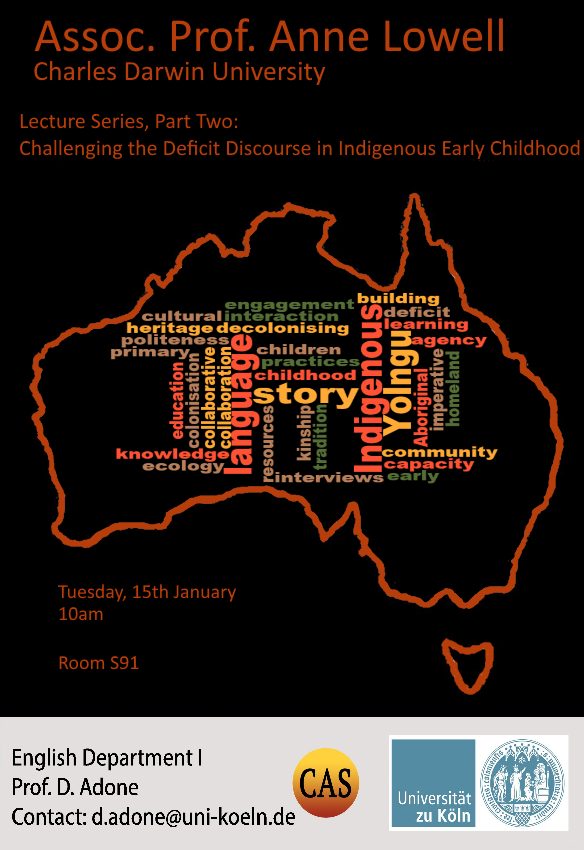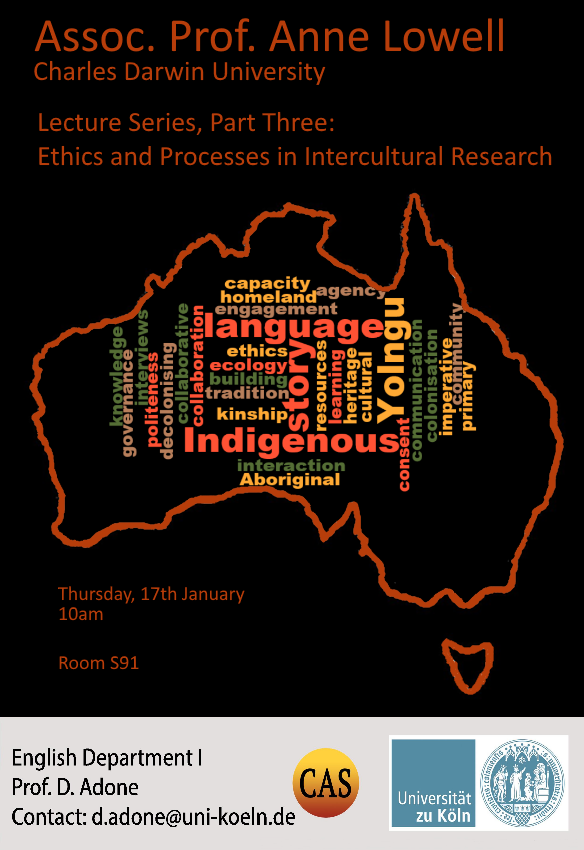Current Events
Guest Lecture in Australian Studies: Professor Stephen Muecke
We are happy to welcome Professor Stephen Muecke for a guest lecture this December. He will present a lecture on "What do you make of an Indigenous Australian Philosophy?”.
The lecture will take place on 16th December, 10am in S76 (Philosophikum).
Guest Lecture Jimmy Smith: Land, Sky & Waters
We are happy to welcome Visiting Distinguished Scholar Jimmy Smith who will present a lecture on "Land, Sky & Waters". The lecture will take place in Hörsaal C (Hörsaalgebäude) on Thursday, 17th October.
On August 14 2024, Prof. Dany Adone presented her lecture Zooming onto Bimodal Bilingualism in Remote Indigenous Communities at the People.Policy.Place Seminar at Charles Darwin University. Click here for more information.
On 27th June 2024, Prof. Dany Adone presented her keynote lecture Decolonising Linguistics in the Anthropocene Era at the conference "Decolonial Dialogues".
We are happy to welcome Dr. Anke Frank, Teresa Cochrane, Bec Beutel, and Merinda Walters who will present a lecture on "Australia: Doing Environmental Science on Country the Right Way - The Importance of Appropriate and Respectful Communication".
If you would like to join the on-campus lecture on May 29, please contact ls-adone(at)uni-koeln.de.
This interdisciplinary publication aims at highlighting the ongoing issues in Indigenous Australia and its First Nations.
Topics to be addressed in the Special Issue include various perspectives ranging from environmental awareness, cultural heritage, health and wellbeing to language and cultural conceptualisation.
You can access the publication online.
UNESCO Year of Indigenous Languages
In concert with the UNESCO Year of Indigenous Languages, the Centre for Australian Studies presents a series of interviews with prominent figures working with indigenous Australian languages and communities. The interviews can be found on the CAS website here.
Past Events
The one-day hybrid workshop Embracing the future together. Reflections on genuine collaboration in repatriation and restitution brings together repatriation practitioners and scholars currently engaged in repatriation and restitution in particular between Oceania and Germany, highlighting the importance of the genuine and equitable collaboration. Indigenous scholars, museum curators, government agencies, as well as researchers in history, anthropology, linguistics and cultural studies to only name a few, are involved in repatriation and restitution, which demonstrate the inter- and transdisciplinary nature of repatriation and restitution research and practice. At the heart of this workshop lies the goal of highlighting the essential role of genuine collaboration in each stage of repatriation and restitution. Each contributor will share their experience and reflect on how genuine collaboration can be implemented.
The workshop is hosted and organised by the Chair of Applied Linguistics (Department of English I) and the Centre for Australian Studies, Prof. Dany Adone and her research team, Anna Gosebrink, M.A. and Mareike Plenk, M.Ed.
Please register for the workshop by November 9th, 2023 via email with Mareike Plenk, event co-organiser: mareike.plenk@uni-koeln.de.
Guest Lecture Prof. Anne Pattel-Gray
On 31st October 2023 Prof. Anne Pattel-Gray from the University of Divinity presented a talk on "Aboriginal Spirituality: Past, Present and Future".
Abstract:
Professor Dr Anne Pattel-Gray will share Australia's First Nations Spirituality, Culture and Ancestral Narratives of the Creator Spirit's actions and interaction with Aboriginal peoples. Exploring the cultural, spiritual, and relational connection to Country and that which defines our obligations, responsibilities and cultural identity. The differences between First Nations values and Western values and the protocols associated to culture and worldview.
Guest Lecture Dr. Christine Black
Dr. Christine Black presented a talk titled "Indigenous Legal Narratives: Finding a Moral Compass in the Age of AI Transformation" on 4th July 2023.
Abstract:
This lecture introduces my latest book, "A Mosaic of Indigenous Legal Thought". The book provides an Indigenous perspective on the transformative power of Artificial Intelligence (AI) in education. The dynamic AI sector is rapidly reshaping our education system, with potential unrecognizable changes by 2028. Recognizing this future, I began writing this book in 2013, emphasizing the need for an Indigenous analysis.
This lecture introduces my recently published book, presenting an Indigenous perspective on AI's transformative impact on education. By exploring the intersection of AI and moral compass development, we can navigate the rapidly evolving technological landscape. This ensures a future where human agency and ethics remain central, empowering individuals to shape their path amidst the AI revolution.
Guest Lecture PD Dr. Felicity Jensz
On 27th June 2023 PD Dr. Felicity Jensz (University of Münster) presented a lecture on "Colonial History and Cultural Heritage: Traces in Mission Archives"
Abstract:
When Europeans invaded the land mass we now call Australia some 200 years ago, there were hundreds of Indigenous languages many of which became extinct because of colonization. Within this lecture, I will discuss missionary archives as locations of knowledge production and storage and how they can be used to revive language. I will particularly draw upon missionary archives that hold material pertaining to the South-Eastern part of the continent, an area in which many Indigenous languages became extinct. The lecture will include some observations as to the potential and the limitations of missionary archives for the revival and maintenance of cultural heritage.
Guest Lecture Associate Professor Duane Hamacher
Associate Professor Duane Hamacher from the University of Melbourne presented a talk titled "Understanding the link between science, language and culture in Indigenous star knowledges" on 20th June 2023.
Abstract:
Aboriginal and Torres Strait Islander elders have long been careful observers of the stars, noting their movements and properties. This was developed into a complex system of knowledge that contains a rich scientific component, which has often been ignored or dismissed. In this lecture, we will examine how careful observation of the sky are embedded in oral narratives, songs, language, and ceremony of cultures that stretch back thousands to tens of thousands of years, re-writing the history and philosophy of science.
Guest Lecture Dr. Gareth Knapman
Dr. Gareth Knapman from the Australian National University presented a a talk titled "The importance of provenance research for repatriation" on 13th June 2023.
In this lecture Dr. Knapman examined the meaning of provenance research, the utility of provenance research and providing a demonstration of provenance research.
Guest Lecture Dr. James McElvenny
Dr. James McElvenny presented a lecture titled "The history of linguists’ ideas on cultural conceptualisation and language" on 13th June 2023.
Abstract:
In this guest lecture, I will present some ideas in the history of modern linguistics that can be considered forerunners to the notion of “cultural conceptualisation” as developed by Sharifian (2011). In particular, I will look at the nineteenth-century traditions of linguistic scholarship that emerged in the wake of Wilhelm von Humboldt (1676–1835) and, from the twentieth century, the Wortfeldtheorie of Jost Trier (1894–1970) as well as “weak” formulations of the so-called Sapir-Whorf hypothesis. I will place these ideas into a genealogy culminating with Sharifian.
Guest Lecture Professor Ghil'ad Zuckermann
On 6th June 2023 Professor Ghil'ad Zuckermann presented a lecture titled "Revivalistics: Language Reclamation and Aboriginal Wellbeing".
Abstract:
This talk and discussion will explain why language revival is (1) right, (2) beautiful, and (3) beneficial. In our current world, more and more groups are losing their intangible heritage. Language reclamation (e.g. Hebrew and the Barngarla Aboriginal language of South Australia), revitalization (e.g. Shanghainese and the Adnyamathanha Aboriginal language) and reinvigoration (e.g. Te Reo Māori and Welsh) are becoming increasingly relevant as more and more people seek to reconnect with their heritage, recover their cultural autonomy, empower their spiritual and intellectual sovereignty, and improve their wellbeing and mental health.
Guest Lecture Honorary Professor Michael Pickering
Honorary Professor Michael Pickering from the Australian National University (ANU) presented a lecture titled "Repatriation in Australia: Resources for the World" on 23rd May 2023.
Abstract:
Australia has been repatriating remains to its Indigenous people for over 30 years. Over this time it has had many successful experiences that have allowed the development of refined process to facilitate the return of remains. There have also been issues that have needed addressing.
In the process of repatriation, Australian researchers and Indigenous communities have also revealed new knowledges about both past and present cultures. This knowledge can inform other repatriating agencies, domestically and internationally.
Repatriation activities in Australia have also had outcomes that can inform the decolonising museums debate. The principles and philosophies that have emerged through repatriation of Ancestral Remains are also those that can apply to the repatriation of other cultural materials.
We are proud to announce the publication of a new open access publication in conjunction with the UNESCO Year of Indigenous Languages, "Fire, Water and Land in Indigenous Australia", edited by Marie Carla D. Adone and Melanie A. Brück from the Centre for Australian Studies. Available cost-free online via the Cologne University Publication Server
New Publication: Papua New Guinea Sign Language Dictionary. Vol. I.
We are proud to announce the release of the first volume of the Papua New Guinea Sign Language Dictionary, compiled by Prof. Dany Adone and Dr. Melanie Brück, in collaboration with John-Paul Hemine, Noah Agino, Michael Lulu, James Knox, and Brent Macpherson in Papua New Guinea. You can order the dictionary from Lincom Europa using the attached form or from the publisher's website here.
Guest Lecture Series by Associate Professor Anne Lowell
"Communication challenges in Indigenous health care."
"Challenging the deficit discourse in Indigenous early childhood: the value of video reflexive ethnography as a decolonising methodology."
"Ethics and processes in intercultural research."
Guest Lecture Dr. Piers Kelly
On Thursday, 15th November 2018, Dr. Piers Kelly from the Max Planck Institute for the Science of Human History in Jena gave a guest lecture entitled “Message Sticks: A long-distance communication practice in Indigenous Australia”.
Abstract:
Message sticks are tools of graphic communication, once used across the Australian continent. While their styles vary, a typical message stick is a flattened or cylindrical length of wood, tapered at one or both ends with motifs engraved on all sides. The hand-sized objects were carried by special messengers over long distances and their motifs were intended to complement a verbally produced communication such as an invitation, a declaration of war, or news of a death. It was only in the late 1880s that message sticks first became a subject of formal anthropological enquiry at a time when the practice was already in steep transition; almost no original research has been published since 1918. As a result, many questions concerning the full scope, function and significance of message sticks remain unanswered. In this presentation I will review colonial efforts to understand these objects, as recorded in surviving documentary and museum archives, and describe transformations or revitalisations of message stick communication that have emerged in contemporary settings. In so doing I will identify the still-unanswered questions concerning their origins, adaptations and significance, and present a case for a renewed cross-disciplinary approach to the subject.
Book Launch Miriwoong Sign Language Dictionary
Prof Dany Adone, Dr KJ Olawsky together with the Miriwoong community launched the first dictionary of Miriwoong Sign Language on Wednesday, 29th August 2018. This dictionary is the first step in the documentation of the Miriwoong Sign Language project. It is the outcome of a longstanding collaboration between the Mirima Dawang Woorlab-gerring Language and Culture Centre in Kununurra and University of Cologne.
Kriol Workshop at Mirima Dawang Woorlab-gerring Language and Culture Centre, Kununurra
Delivered by Prof Dany Adone and Dr Melanie Brueck at the Mirima Dawang Woorlab-gerring Language and Culture Centre in Kununurra, 29-31 August 2018. The main goal of the workshop was to raise awareness on Creole languages, especially Kununurra Kriol.
Guest Lecture Dr. Miriam Meyerhoff
On the 17th May, 2018, Dr. Miriam Meyerhoff presented a guest lecture titled "The Aesthetics of Variation"
Abstract:
It is well-accepted that studies of language variation contributes to linguistic theory, theories of human cognition and the historical relationships between languages. However, the aesthetic and ludic functions of language have largely been ignored by variationists. Linguists have largely ceded the discussion of these functions to anthropology or stylistics. While it is true that most of the variation observed in my fieldwork on Nkep is constrained by linguistic or attentional (cognitive) factors, in this paper I turn my attention to constraints that cannot so readily by explained by linguistic theories. Instead, they seem to be motivated by considerations of euphony, playfulness or aesthetic value. While these are seldom the focus of our analytic attention, they are clearly a function of human language and perhaps should not be excluded so systematically from variationist research.
Guest Lecture Dr. Carol Dowling
On 27th June, 2017, Dr. Carol Dowling gave a guest presentation titled "Melbin & the power of Aboriginal stories: Experiences, Challenges and Methodologies"
Abstract:
Badimaya/Yamatji academic, Dr Carol Dowling has worked in the field of Aboriginal Cultural Studies for over 28 years. Dr Dowling is visiting Cologne to represent her twin sister, Dr Julie Dowling who is one of Australia’s prominent portrait artists for her solo exhibition at Gallarie Seippel. This exhibition is about the untold history of Aboriginal slavery in Australia. In her own right, Dr Carol Dowling is an Anthropologist having studied her doctorate on autoethnography of five generations of women in her maternal family. This study goes back to her great great-grandmother, Melbin, who was the first woman to have contact with white people in her family. One of the many stories passed down to the Dowling twins was that Melbin was taken to England as an exhibit in 1883. Dowling has come to Cologne to share her family story and to talk about the work she is doing at the Centre for Aboriginal Studies at Curtin University in Perth, Western Australia.
Guest Lecture Dr. Angela Nonaka
On 22nd November, 2016, Dr. Angela Nonaka presented a guest lecture titled "New ‘DEAF-initions ‘of Linguistic Diversity in Southeast Asia".
Abstract:
Southeast Asia is a linguistically and culturally heterogeneous region. Among scholars as well as the general public, however, understanding and appreciation of the full extent of that diversity has yet to be fully realized because an entire class of languages—sign languages—have been overlooked and excluded from most documentary anthropological linguistic accounts. This is certainly the case in Thailand, a highly multilingual society with a complex language ecology that includes numerous spoken languages and signed languages.
Using Thailand as a case study, this presentation demonstrates both the need and the potential for broadening ‘DEAF-initions’ of linguistic and cultural diversity through the study of languages expressed in the manual modality. This presentation identifies examples of different types of extant sign languages found in the country; describes typical characteristics of their respective speech communities; and assesses each language’s current state of vitality or endangerment. Furthermore, by examining unusual features of those signing varieties, this lecture illustrates the ways in which research on un(der)documented manual-visual languages contributes to our collective understanding of language typologies, language universals, historical comparative linguistics, and so forth.
Guest Lecture Dr. Ghil'ad Zuckermann
On 10th November, 2016, Dr. Ghil'ad Zuckermann gave the guest lecture titled "Language Reclamation and Social Wellbeing: Revivalistics - A New Trans-Disciplinary Field of Enquiry."
Abstract:
This lecture will explain why language revival and diversity are (1) right, (2) beautiful, and (3) beneficial. In our globalized world, more and more groups are losing their heritage. Language revival is becoming increasingly relevant as more and more people seek to reconnect with their ancestors, recover their cultural autonomy, empower their spiritual and intellectual sovereignty, and improve their wellbeing and mental health. There is an urgent need to offer comparative insights, for example from the Hebrew revival, which is so far the most successful known linguistic reclamation. For example, Israeli, ‘Reclaimed Hebrew’, demonstrates that some linguistic components are more revivable than others.
Given capricious governmental policies, this lecture will propose compensation (for linguistic activities) for peoples whose mother tongue was killed (linguicide), making Indigenous tongues the official languages of their region, and erecting multi-lingual official signs. Australia, for example, ought to learn from New Zealand.
The lecture will introduce Revivalistics, a new trans-disciplinary field of enquiery, and provide examples from all over the globe, e.g. from the reclamation of the Barngarla Aboriginal language in South Australia.
Guest Lecture Dr. Bentley James & Laurie Baymarrwanga
On 27th September, 2016, Dr. Bentley James and Laurie Baymarrwanga presented a guest lecture titled "Ancestral Voices in the Wind :Strategies for the Intergenerational Transmission of Yan-nhangu."
Abstract:
This paper refocuses attention on the metaphysical nature of drivers for the intergenerational transmission of the Yan-nhangu language. On his return from Murrungga in 1938 Dr Thomson records that: ‘Tradition, handed on in mythology, furnishes ... the motive, the driving force, in all behaviour and practice, even in matters of material culture’ (Thomson 1938: 195). I show evidence of the continuing force and motivation for Yan-nhangu language use on the Crocodile Islands as directed by Baymarrwangga. Using archival examples and more recent work I show how we translated urging ancestral precedent into strategies for linguistic, cultural and biological engagements for all ages. Through ‘Language Nests’, Ranger Programs, Heritage programs and the development of resources continuities with local practices are encouraged
Guest Lecture Dr. Doug Marmion
On the 10th December, 2015, Dr. Doug Marmion gave a guest lecture titled "Language revival in Australia: bringing back Ngunawal"
Abstract:
According to the 2014 National Indigenous Languages Survey, of Australia’s 250 Indigenous languages over 100 no longer have any speakers. Nevertheless, many communities in this situation are very keen to attempt to bring their languages back into daily usage. In this talk I will outline the status of Australia’s Indigenous languages and describe my work with the Ngunawal language community of Canberra to rediscover their language and return it to the descendants of the last speakers.


